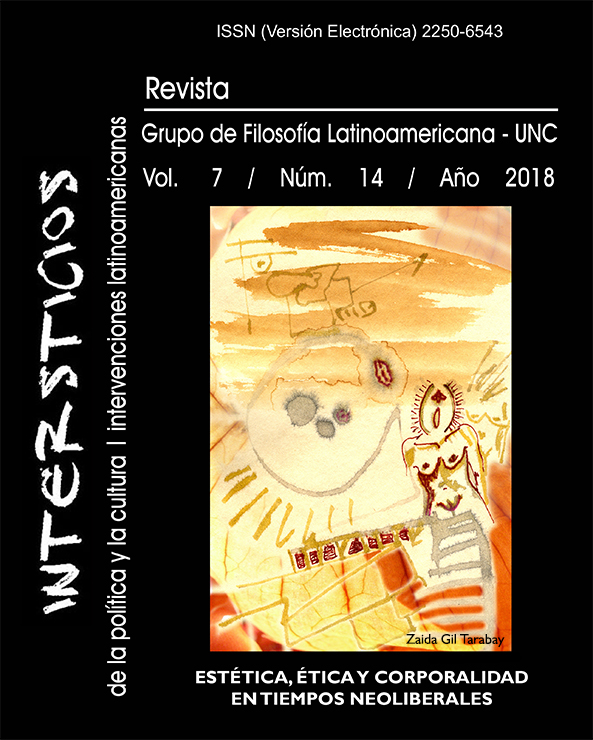Politics and youth cultures. A case analysis of the "Seres Vivientes Crew" and "La Jungla Hip Hop" groups (Barranquilla, Colombia)
Keywords:
youths, dramatization of identities, youth cultures, political participationAbstract
From the hegemonic discourse in Colombia it is valid until the policy manifests itself in the formal processes of participation directed to the political systems, to the point that the social problems of the country have been allowed. This is a way of knowing that there are other ways in which youths carry out policies that are not officially regulated, but respond to the dynamics of their practices that privilege the field of culture. Given this panorama, youth cultures must be analyzed as contemporary forms of organization, since, through cultural expressions, they show political positions in front of a determined social order. In this context, the sociological preoccupation of understanding the way in which the dramatization of collective identities (Reguillo, 2012) has been pertinent to youth organizations in the city of Barranquilla has arisen to put on the public scene the positions that, although they are not recognized as policies from the beginning, social change is considered as a priority in their agendas. How does the dramatization of the collective identities of The Hip Hop Jungle and Living Beings Crew in the Plaza de la Paz take place? What characteristics said identity elaborations? What political perspectives can we recognize in these cultural practices? This work allows us to understand the cultural practices of youth, no, no, be, be, as, devoid of positioning, on the contrary, we can recognize the political connotation of their expressions and thus, approach the aspects of contemporary youth politicization.Downloads
References
Ai, Y. (21 de Enero de 2015). La llegada de la cultura Hip Hop a Barranquilla. (L. Mancera, & L. M. Otazua, Entrevistadores)
Barrios, A. (06 de marzo de 2017). Entrevista a lidereza del Colectivo Mujeres Al Derecho COLEMAD. (L. C. Panza, Entrevistador)
Bboy Master, J. C. (20 de diciembre de 2014). Grupo focal Seres Vivientes Crew. (L. Mancera, & L. M. Otazua, Entrevistadores)
Bboy Shadown, M. K. (octubre de 2014). (L. Mancera, & O. L. Marcela, Entrevistadores)
Bgirl Nore, N. M. (20 de diciembre de 2014). (L. Mancera, & L. M. Otazua, Entrevistadores)
Big Chamo, V. D. (diciembre de 2014). (O. L. Mancera Lorena, Entrevistador)
Castells, M. (1999). La Era de la Información: Economía, Sociedad y Cultura VOL.II El Poder De La Identidad. México: Siglo Veintiuno Editores
De Sousa Santos, B. (2001). “Los Nuevos Movimientos Sociales”. Observatorio Social de América Latina OSAL - CLACSO.
Goffman, E. (1993). “La Presentación De La Persona En La Vida Cotidiana”. Buenos Aires .
Mancera Panza, L. C., & Otazua Tamara, L. M. (2015). La Cultura política juvenil en Barranquilla mirada a través de la dramatización de las identidades colectivas. Un estudio de caso con las agrupaciones Seres Vivientes Crew y La Jungla Hip Hop. Barranquilla.
Moraga González, M., & Solórzano Navarro, H. (2005). Cultura Urbana Hip Hop. Movimiento contracultural emergente en los jóvenes de Iquique. Valparaíso: Cidpa.
Polo, C. (20 de diciembre de 2014). Las Tribus de la Plaza de La Paz . El Heraldo .
Reguillo, R. (2012). Culturas Juveniles. Formas Políticas del desencanto. Buenos Aires: Siglo Veintiuno Editores .
Secretaría de Gestión Social, A. D. (28 de diciembre de 2015). Acuerdo 0020 Por Medio del cual se adopta la Politica Pública de Juventud en Barranquilla. Barranquilla, Atlántico, Colombia.
Secretaría de Gestión Social, B. (2014). Política Pública De Juventud Del Distrito De Barranquilla - Atlántico 2014 – 2024 “Jóvenes con Propósito para una Barranquilla que florece”. Barranquila: Secretaría de Gestión Social.
Silva, A. (2006). Imaginarios Urbanos. Quinta Edición. Bogotá : Arango Editores .
Stake, R. (1999). Investigación Con Estudio De Caso. Madrid : Segunda Edición Morata.
Downloads
Published
Issue
Section
License
Authors who have publications with this journal agree to the following terms:
a. Authors will retain their copyright and grant the journal the right of first publication of their work, which will simultaneously be subject to the Creative Commons Attribution License that allows third parties to share the work as long as its author and first publication in this journal are indicated.
b. Authors may adopt other non-exclusive license agreements for distribution of the published version of the work (e.g., deposit it in an institutional telematic archive or publish it in a monographic volume) as long as the initial publication in this journal is indicated.
c. Authors are allowed and encouraged to disseminate their work through the Internet (e.g., in institutional telematic archives or on their web page) after the publication process, which may produce interesting exchanges and increase citations of the published work (see The effect of open access).


